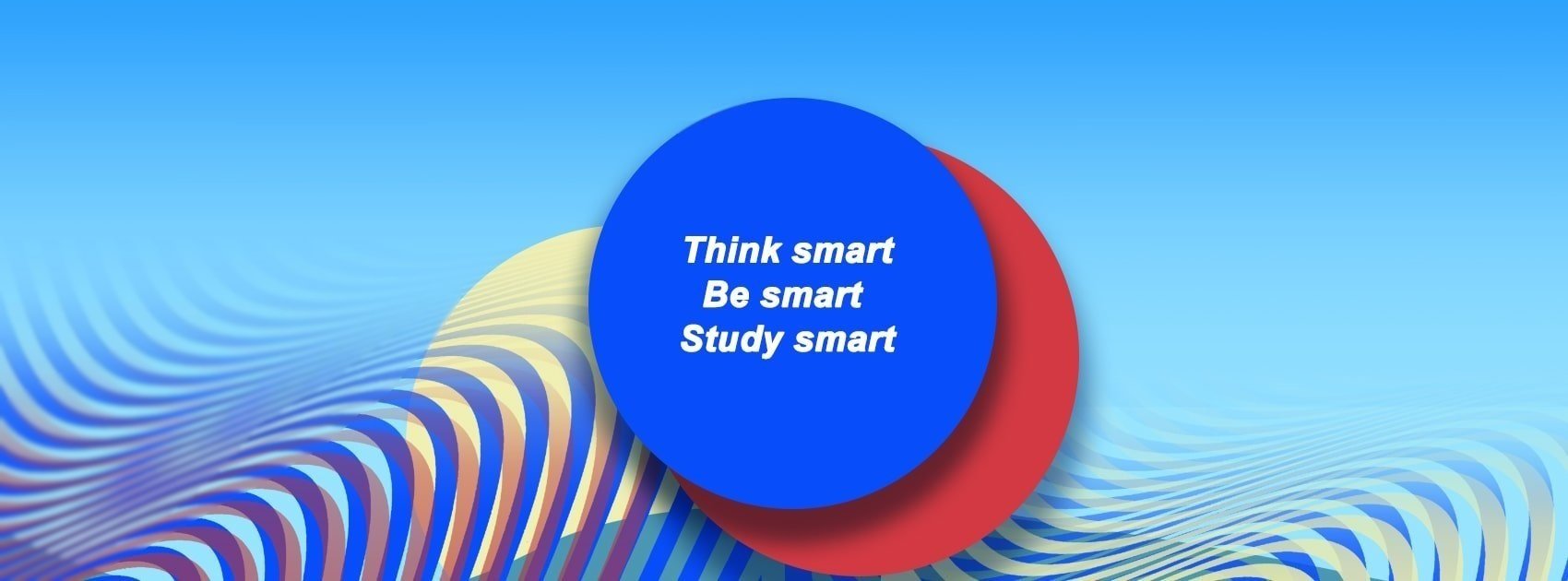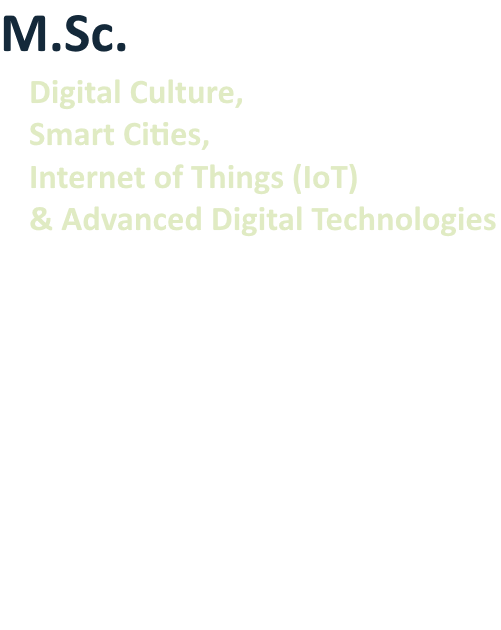Invitation for Applications for the Master of Science (MSc) Program "Digital Culture, Smart Cities, IoT, and Advanced Digital Technologies."
UNIVERSITY OF PIRAEUS
SCHOOL OF INFORMATION AND COMMUNICATION TECHNOLOGIES
DEPARTMENT OF INFORMATICS
- «Digital Culture».
- «Smart Cities and Advanced Digital Technologies».
- «Internet of Things (IoT) and Advanced Digital Technologies».
In the MSc program, holders of a bachelor's degree from domestic or foreign institutions are accepted in accordance with the provisions of Law 4957/2022. For more information, you can refer to each Σpecialization/Τrack of the MSc program at the following website: http://www.cs.unipi.gr/dcsciot
The MSc program prepares scientists and young professionals from different scientific fields to lead the country into the digital era. This interdisciplinary approach, spanning from Computer Science to Culture and Humanities, from Archaeology and Architecture to Legal Sciences, and from Spatial Planning to modern Technologies, is essential. It provides an opportunity for scientists and young professionals to collaborate, generate knowledge, and evolve our cities in the transition to the digital age. This postgraduate program is designed for graduates from various scientific fields, creating a common communication platform among scientists in topics related to the three tracks of the MSc program.
The Specialization/Track "Digital Culture" aims to educate and train scientists from various disciplines in theoretical, scientific, and technological fields. Its goal is to promote the emergence, protection, promotion, and management of cultural assets through the contribution of advanced digital technologies. It equips students with the necessary knowledge of the latest global trends in the emerging interdisciplinary field of digital culture, ensuring the development and shaping of a new digital strategy in the cultural sector. It promotes the preservation and promotion of cultural heritage in our country, highlighting new ways of effective management of cultural organizations within the broader context of social and educational policies. It combines contemporary fields of knowledge, including 3D modeling, the application of mixed reality technologies (Virtual Reality, Augmented Reality, Virtual Worlds), mobile communications, internet technologies, social media, signal processing, and multimedia, with the ultimate goal of optimal digital management, documentation, and curation of cultural heritage as well as aspects of contemporary culture. As our country possesses a rich cultural heritage in a continent (Europe) that is itself a cultural powerhouse, enhancing interdisciplinary approaches will contribute to the strengthening of the Creative Industries, the protection of our cultural heritage, and the promotion of contemporary creation.
The Specialization/Track "Smart Cities and Advanced Digital Technologies" aims to educate and train scientists from different fields to work in the new digital urban landscape and design and support new services in constantly evolving "Smart Cities." These cities are interconnected with infrastructures and functions such as transportation, communications, smart homes, e-governance, smart grids, intelligent cultural heritage, smart health, smart agriculture, smart digital infrastructure, intelligent energy management, the modern ecosystem, innovation, cloud computing, and more. It also aims to provide technological expertise for managing complex urban issues, integrating systems and technologies into the modern digital city, designing digital cities, providing the necessary tools for developing innovative governance systems for a safe and sustainable city, and designing and supporting functional and effective methods of energy management, sustainable ecosystems, smart disaster management, and resource conservation.
The Specialization/Track "Internet of Things (IoT) and Advanced Digital Technologies" aims to educate and train scientists from different fields, primarily in the areas of exact and technological sciences. It provides the necessary knowledge for designing, managing, and supporting new services on IoT platforms, managing complex projects, and equips individuals with the skills to design and develop appropriate and innovative systems, services, and applications for modern governance. It involves the analysis of big data, provides technological expertise in designing interdependent IoT systems that are connected to the functions of the digital city, 5G and communications, smart homes, transportation, construction, energy, smart grids, smart health, smart agriculture, smart security, service provision, smart digital infrastructure, education, governance system development, data security, privacy-integrity of personal data, interoperability of systems and devices, system security, cloud computing, and content delivery networks.
Indicatively and depending on the specialization/direction: Departments/Schools of Information and Communication Technologies, Engineering, Fine Arts, Architecture, Urban Planning, Philosophy, Humanities, Natural Sciences or Technological Sciences, Agricultural Sciences, Education, Theology, Economics and Social Sciences, Economics - Business and International Studies, Maritime and Industrial Studies, Social Sciences, Polytechnic Engineering or Polytechnic Schools, Environmental Engineering, Law, Computer Science Departments, Sound & Image Arts, Cultural Technology & Communication, Information and Communication Technologies Departments, Cultural Heritage and New Technologies Management, Media and Culture Communication, Digital Media, Communication and Cultural Management, Conservation of Antiquities & Artworks, History and Archaeology, Graphic Design, Informatics and Mass Media, Management - Economics and Communication, Cultural and Tourism Units, Archives, Library Science and Museology, Photography & Audiovisual Arts, Greek and European Culture, Informatics Engineering T.E., Physics, Mathematics, Chemistry, Spatial Planning and Regional Development, Civil Engineering, Production and Management Engineering, Mineral Resources Engineering, Electrical Engineering and Computer Engineering, Education Departments, Special Education, History - Archaeology and Social Anthropology, Aquatic Environment, Political Science and Public Administration, Communication and Mass Media, Media and Culture Communication, Theatre Studies, Philosophy, Pedagogy and Psychology, Geology and Geoenvironment, History and Philosophy of Science, Public Administration, Economic and Regional Development, Social and Political Sciences, Social Anthropology, Sociology, Psychology, and other related disciplines), as well as graduates of Universities, Polytechnic Schools and Technical Educational Institutions (TEI) or Vocational Training Institutes (ASPETE) of Greece, and graduates of equivalent foreign Higher Education Institutions.
Interested parties can apply online until 31 May 2025 at https://cssites.cs.unipi.gr/registration/dicul.php and send the application form and the following documents, stating their full name to the email dcsciot@unipi.gr. Applications are also accepted by post if sent to the Department of Informatics of the University of Piraeus by the deadline.
Candidates are required to submit their application and relevant documents to the Secretariat of the M.Sc. program. They should also electronically submit their application through the website: http://www.cs.unipi.gr/registration/dicul.php. Applications can be accepted by mail if they are sent to the Secretariat of the M.Sc. program "Digital Culture, Smart Cities, IoT, and Advanced Digital Technologies" at the Department of Informatics of the University of Piraeus, until the deadline.
The relevant documents include:
* In case the degree has not been awarded, a "Certificate of Completion of Studies" can be provided by the Registrar's Office.
Undergraduate students can apply; however, if accepted, they must have submitted their Bachelor's Degree/Diploma or the Certificate of Completion of Studies by the registration date (October 2023).
The tuition fees for the M.Sc. program amount to €1,500 per semester (3 semesters in total) and must be prepaid to the University of Piraeus Research Center's account. According to the law, a percentage of students are eligible for tuition fee exemption if they meet the financial criteria set by the law.
For more information, you can visit the website of the Master's program "Digital Culture, Smart Cities, IoT, and Advanced Digital Technologies" at http://www.cs.unipi.gr/dcsciot or contact us via email at dcsciot@unipi.gr or by phone at +30 210-4142451.
The selection of candidates is carried out by a committee of members of the Teaching and Research Staff (Selection Committee), which is formed by the decision of the Assembly. The selection criteria, as well as the details of their implementation (such as scores, coefficients), are made known to the candidates through the announcement of the M.Sc. program and are as follows:ν προκήρυξη του ΠΜΣ και είναι τα ακόλουθα:
1. Bachelor's degree grade or GPA (25%).
2. Type and scope of work and/or professional and/or research experience (25%).
3. Letters of recommendation (10%).
4. English language proficiency (5%).
5. Other elements included in the curriculum vitae (5%).
6. Interview (30%).
Interested applicants can submit their applications electronically through the website: https://www.cs.unipi.gr/registration/dicul.php until October 30, 2023, and send the application and the following supporting documents by email to dcsciot@unipi.gr, indicating their full name. Applications are also accepted by mail if they are sent to the Department of Informatics, University of Piraeus, by the deadline.
Contact Information:
Secretariat of M.Sc. "Digital Culture, Smart Cities, IoT, and Advanced Digital Technologies"
Email: dcsciot@unipi.gr
Facebook Page (Specialization/Track "Digital Culture"): https://www.facebook.com/digital.culture.unipi









